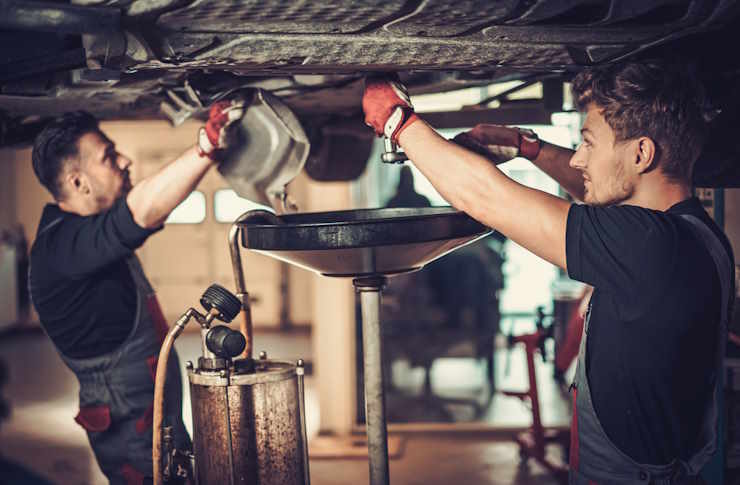Engine Repair Training: How to Learn Essential Skills, Tools, and Safety Practices for Automotive Maintenance
Engine repair training provides a solid foundation for anyone interested in maintaining and repairing automotive engines. This article explains what to expect from a typical training program, including hands-on practice with essential tools, learning diagnostic techniques, and understanding important safety procedures. By exploring the key skills taught and the structure of different courses, you can make an informed decision about which training best fits your goals. Whether you are new to automotive maintenance or looking to expand your expertise, proper training is an important step toward working confidently and safely with engines.

What are the essential skills for engine repair?
Engine repair training programs focus on developing a core set of skills that are crucial for automotive maintenance. These typically include understanding engine components and systems, reading and interpreting technical manuals and diagrams, and mastering various repair techniques. Students learn about the internal combustion process, fuel systems, cooling systems, and electrical systems. Additionally, training covers skills such as precision measurement, torque application, and proper parts replacement procedures. Troubleshooting and diagnostic skills are also emphasized, enabling trainees to identify and resolve complex engine issues efficiently.
Which types of tools are used in automotive maintenance?
Automotive maintenance requires a diverse array of specialized tools. Engine repair training programs introduce students to both basic hand tools and more advanced diagnostic equipment. Common hand tools include socket sets, wrenches, pliers, and screwdrivers. Specialized tools like torque wrenches, valve spring compressors, and piston ring compressors are also covered. Diagnostic tools play a crucial role in modern engine repair, and trainees learn to use onboard diagnostic (OBD) scanners, multimeters, and compression testers. Some programs may also introduce more advanced equipment such as engine analyzers and dynamometers, providing a comprehensive understanding of the tools used in professional automotive settings.
How important are safety practices in engine repair?
Safety is paramount in engine repair, and training programs place a strong emphasis on proper safety practices. Students learn about personal protective equipment (PPE) such as safety glasses, gloves, and appropriate footwear. Training covers safe handling of hazardous materials like oils, coolants, and solvents, as well as proper disposal methods. Electrical safety is also a key focus, given the high voltages present in modern vehicles. Trainees learn about fire safety, including the use of fire extinguishers and the importance of maintaining a clean work area. Additionally, programs often cover ergonomics and proper lifting techniques to prevent injuries during engine work.
What does hands-on training and diagnostics involve?
Hands-on training is a critical component of engine repair education. Students work on real engines, often in various states of disassembly, to gain practical experience. This typically involves tasks such as removing and replacing components, measuring tolerances, and reassembling engines. Diagnostic training teaches students to use both their senses and diagnostic tools to identify engine problems. Trainees learn to interpret engine sounds, smells, and visual cues that may indicate specific issues. They practice using diagnostic scanners to read error codes and perform advanced tests. Many programs also incorporate simulated fault scenarios, allowing students to hone their troubleshooting skills in a controlled environment.
How can one choose the right engine repair training program?
Selecting the right engine repair training program depends on several factors. Consider the program’s accreditation and reputation within the automotive industry. Look for courses that offer a balance of theoretical knowledge and hands-on experience. The quality and variety of equipment available for training are also important considerations. Some programs specialize in specific brands or types of engines, which may be beneficial depending on your career goals. Consider the instructor’s qualifications and industry experience as well. It’s also worth checking if the program offers any certifications or if it prepares students for industry-standard certifications like ASE (Automotive Service Excellence). Lastly, consider the program’s duration, cost, and scheduling options to ensure it fits your personal circumstances and learning goals.
What career opportunities are available after engine repair training?
Engine repair training can open up a variety of career paths in the automotive industry. Graduates may find opportunities as automotive technicians in dealerships, independent repair shops, or fleet maintenance facilities. Some may specialize in specific areas such as performance engines or diesel engines. With experience, trained professionals can advance to roles such as shop foreman or service manager. Others may choose to start their own repair businesses or specialize in classic car restoration. The skills learned in engine repair training are also valuable in related fields such as motorsports, marine engine repair, or heavy equipment maintenance.
For those considering engine repair training programs, it’s important to understand the potential costs involved. Here’s a comparison of different types of training options:
| Training Type | Duration | Estimated Cost Range | Key Features |
|---|---|---|---|
| Community College Program | 1-2 years | $5,000 - $15,000 | Associate degree, broad curriculum |
| Technical School Program | 6-12 months | $10,000 - $20,000 | Focused training, industry partnerships |
| Manufacturer-Specific Training | Varies | $1,000 - $5,000 per course | Brand-specific knowledge, advanced diagnostics |
| Online Courses | Self-paced | $500 - $2,000 | Flexible schedule, limited hands-on experience |
| Apprenticeship Programs | 2-4 years | Paid position | On-the-job training, earn while you learn |
Prices, rates, or cost estimates mentioned in this article are based on the latest available information but may change over time. Independent research is advised before making financial decisions.
In conclusion, engine repair training offers a comprehensive pathway to developing the skills, knowledge, and safety practices essential for automotive maintenance. By choosing the right program and committing to hands-on learning, aspiring technicians can build a strong foundation for a rewarding career in the automotive industry. As vehicle technology continues to evolve, ongoing education and adaptability will be key to long-term success in this field.
The shared information of this article is up-to-date as of the publishing date. For more up-to-date information, please conduct your own research.




